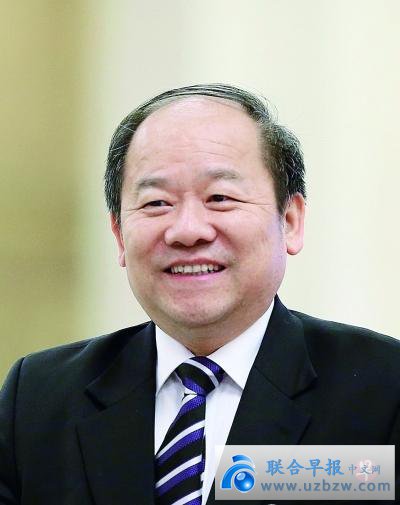 Ning Jizhe, director of China's National Bureau of Statistics: Accurate and timely economic data is the key to keeping a pulse on China, the world's second largest economy.(Internet)
Ning Jizhe, director of China's National Bureau of Statistics: Accurate and timely economic data is the key to keeping a pulse on China, the world's second largest economy.(Internet)
In an interview with Bloomberg TV in Beijing, Ning Jizhe said: For individual aspects, there are statistical false phenomena in some fields, although it is an individual and a small number of fields, we implement zero tolerance and strictly investigate and deal with it.He said that some regions previously overreported data, but now the statistics are generally credible and comparable to the international ones.
(Bloomberg, Beijing) China's economic growth this year is likely to exceed its full-year target of around 6.5 percent, based on accurate economic data, Ning Jizhe, director of China's National Bureau of Statistics, said last week.
In an interview with Bloomberg TV in Beijing last week, Ning Jizhe said: For individual areas, there are statistical false phenomena in some fields. Although it is an individual and a small number of fields, we implement zero tolerance and strictly investigate and punish.He said that some regions previously overreported data, but now the statistics are generally credible and comparable to the international ones.
Investors are trying to assess the impact of current efforts to cut capacity and deleveraging, as well as the U.S.-China trade dispute.Against this backdrop, accurate and timely economic data is key to keeping a pulse on China, the world's second largest economy.However, China's statistics have been viewed with suspicion in the past because of deliberate falsification of data.Also, measuring the performance of a rapidly changing economy like China presents technical difficulties.
The extraordinary stability and predictability of China's economic growth has also raised questions about the statistics.Over the past three years, economic growth has remained within a narrow range of 6.7% to 6.9%. Some private research institutions said that the National Bureau of Statistics overestimated or underestimated the growth rate, while others believed that the statistics department flattened the pace of growth.
Provincial-level statistics have also been called into question; current Premier Li Keqiang reportedly said in 2007, when he was party secretary of Liaoning, that some of the Gross Regional Product (GRP) data were man-made and therefore unreliable.Liaoning Province has recently been found to falsify statistics, as have Jilin, Tianjin and Inner Mongolia.
Ning Jizhe promised to tackle the problem with better technology, thorough investigations and the exclusion of local officials from the data-gathering phase.Excluding local government officials from statistics such as industrial value added ensures that the data goes straight to Beijing.By next year, the ONS will also be calculating GDP for each region, in addition to GDP.
The number of law enforcement officers to combat data fraud has increased from about 10 to 60
Fifteen years ago, the combined economic output of China's 31 provinces and municipalities was more than 10% higher than the official national total, due to local government officials falsifying their province's statistics.Ning Jizhe said that this year the difference between the two will narrow to 1%.
The Bureau of Statistics Enforcement and Supervision, which is tasked with cracking down on data falsification, has increased to 60 staff from around 10 last April, the NBS said.Ning Jizhe said that the team investigates every case of statistical falsification.He said: False reporting and exaggerating data now will not only prevent promotion, but also demotion.
Although Ning Jizhe is optimistic about economic growth for the rest of the year, the risks facing the Chinese economy have increased.In July, a series of economic indicators did not perform as expected, and the growth rate of fixed asset investment in the first seven months slowed to a record low.Government investment rose just 1.5 percent during the period, also a record low, well below the 11.7 percent rise a year earlier as the government tightened borrowing rules.You can see that the number of state-owned investment is low from January to July, mainly because some infrastructure projects of local governments are due to funding problems, some are being cleaned up, and some are undergoing compliance and reasonable inspections.
Ning Jizhe is a Ph.D. majoring in national economic planning management at Renmin University of China. He was once Secretary of the Party Leadership Group of the Research Office of the State Council. He was also in charge of long-term development planning, including the development of the western region. He has been leading the National Bureau of Statistics since January last year.He also serves as the deputy director of the National Development and Reform Commission and accompanied Vice Premier Liu He in trade negotiations with the United States.
Ning Jizhe believes that the trade war is the biggest risk facing the Chinese economy in the second half of 2018.The most important factor in the current risk is indeed the severe and complex and further changes in the international economic environment, including Sino-US economic and trade frictions and frictions between the United States and other countries.He said that the fundamentals of China's economy are still solid, because economic growth does not depend on external demand.
Ning Jizhe recently went to Tianjin to inspect the national economic census every four or five years, which covers tens of millions of enterprises across the country.The service sector accounts for half of China's economy, yet many official figures do not reflect the performance of the service sector.Capturing the true economic performance is difficult, Ning Jizhe said, not only because of the size and diversity of the economy, but also because many people are reluctant to report the real situation.Some local governments were willing to overreport data, but individuals and businesses were willing to underreport data.why?He pays less taxes, does not reveal his wealth, and does not allow us statisticians to enter richer communities.



